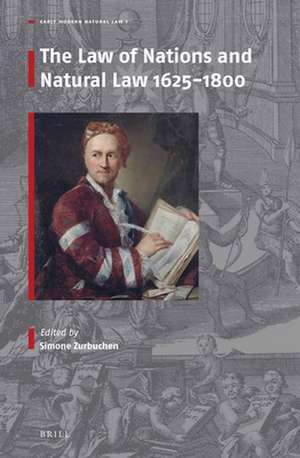The Law of Nations and Natural Law 1625–1800: Early Modern Natural Law: Studies & Sources, cartea 1
Editat de Simone Zurbuchenen Limba Engleză Hardback – 14 aug 2019
A specialist on the law of nations in the Swiss context and on its major figure, Emer de Vattel, Simone Zurbuchen prompted scholars to explore the law of nations in various European contexts. The volume studies little known literature related to the law of nations as an academic discipline, offers novel interpretations of classics in the field, and deconstructs ‘myths’ associated with the law of nations in the Enlightenment.
Preț: 723.31 lei
Preț vechi: 1123.33 lei
-36% Nou
Puncte Express: 1085
Preț estimativ în valută:
138.42€ • 150.31$ • 116.27£
138.42€ • 150.31$ • 116.27£
Carte indisponibilă temporar
Doresc să fiu notificat când acest titlu va fi disponibil:
Se trimite...
Preluare comenzi: 021 569.72.76
Specificații
ISBN-13: 9789004384194
ISBN-10: 9004384197
Pagini: 338
Dimensiuni: 155 x 235 x 27 mm
Greutate: 0.7 kg
Editura: Brill
Colecția Brill
Seria Early Modern Natural Law: Studies & Sources
ISBN-10: 9004384197
Pagini: 338
Dimensiuni: 155 x 235 x 27 mm
Greutate: 0.7 kg
Editura: Brill
Colecția Brill
Seria Early Modern Natural Law: Studies & Sources
Notă biografică
Simone Zurbuchen, Ph.D. (1991), University of Zurich, is Professor of Modern and Contemporary Philosophy at the University of Lausanne. She has published widely on early modern moral and political philosophy, focusing on Samuel Pufendorf and the Swiss-romande school of natural law.
Recenzii
"This is an extremely valuable work on natural law that actually manages to bring theory and practice together by displaying for the reader how these topics were understood not just by theorists, but by those who engaged in practical politics. Summing Up: Highly recommended. Lower-division undergraduates through faculty; professionals." - Michael Harding, Montgomery College, in: Choice Connect, Vol. 57, No. 7 (March 2020).
"The book provides numerous profound insights into a variety of texts and contexts in the European development of natural law and the law of nations and illustrates its importance in creating a shared European language and mental horizon not only for academics, but also for political practitioners and the ruling classes". Gabriella Silvestrini, in Grotiana, 42 (2021), pp. 161-177.
"The book provides numerous profound insights into a variety of texts and contexts in the European development of natural law and the law of nations and illustrates its importance in creating a shared European language and mental horizon not only for academics, but also for political practitioners and the ruling classes". Gabriella Silvestrini, in Grotiana, 42 (2021), pp. 161-177.
Cuprins
Acknowledgements
Notes on Contributors
Introduction
Simone Zurbuchen
Part 1
Teaching the Law of Nations
1 Natural Law for the Nobility? The Law of Nature and Nations at the Erlangen Ritterakademie (1701–1741)
Katharina Beiergroesslein and Iris von Dorn
2 Serving Danish Foreign Policy: Andreas Hojer’s De eo quod iure belli licet in minores (1735)
Mads Langballe Jensen
3 The Law of Nations at the Naval Academy in Copenhagen around 1800: the Lectures of Christian Krohg
Thor Inge Rørvik
4 The Law of Nations in German historia literaria and Encyclopaedias in the Eighteenth Century
Frank Grunert
Part 2
The Law of Nations from the Peace of Westphalia to the Enlightenment
5 Pufendorf on the Law of Sociality and the Law of Nations
Kari Saastamoinen
6 The International Political Thought of Johann Jacob Schmauss and Johann Gottlieb Heineccius: Natural Law, Interest, History and the Balance of Power
Peter Schröder
7 Men, Monsters and the History of Mankind in Vattel’s Law of Nations
Pärtel Piirimäe
8 Guarantee and Intervention: the Assessment of the Peace of Westphalia in International Law and Politics by Authors of Natural Law and of Public Law, c. 1650–1806
Patrick Milton
Part 3
The Law of Nations and the ‘École romande du droit naturel’
9 Born to Rule: Burlamaqui and Rousseau on the Education of Princes
Lisa Broussois
10 Defining the Law of Nations: the École romande du droit naturel and the Lausanne Edition of Grotius’ De jure belli ac pacis (1751–1752)
Simone Zurbuchen
11 Vattel’s Doctrine of the Customary Law of Nations between Sovereign Interests and the Principles of Natural Law
Francesca Iurlaro
12 The Circulation of the École romande du droit naturel in Eighteenth-Century Italy
Elisabetta Fiocchi Malaspina
Index
Notes on Contributors
Introduction
Simone Zurbuchen
Part 1
Teaching the Law of Nations
1 Natural Law for the Nobility? The Law of Nature and Nations at the Erlangen Ritterakademie (1701–1741)
Katharina Beiergroesslein and Iris von Dorn
2 Serving Danish Foreign Policy: Andreas Hojer’s De eo quod iure belli licet in minores (1735)
Mads Langballe Jensen
3 The Law of Nations at the Naval Academy in Copenhagen around 1800: the Lectures of Christian Krohg
Thor Inge Rørvik
4 The Law of Nations in German historia literaria and Encyclopaedias in the Eighteenth Century
Frank Grunert
Part 2
The Law of Nations from the Peace of Westphalia to the Enlightenment
5 Pufendorf on the Law of Sociality and the Law of Nations
Kari Saastamoinen
6 The International Political Thought of Johann Jacob Schmauss and Johann Gottlieb Heineccius: Natural Law, Interest, History and the Balance of Power
Peter Schröder
7 Men, Monsters and the History of Mankind in Vattel’s Law of Nations
Pärtel Piirimäe
8 Guarantee and Intervention: the Assessment of the Peace of Westphalia in International Law and Politics by Authors of Natural Law and of Public Law, c. 1650–1806
Patrick Milton
Part 3
The Law of Nations and the ‘École romande du droit naturel’
9 Born to Rule: Burlamaqui and Rousseau on the Education of Princes
Lisa Broussois
10 Defining the Law of Nations: the École romande du droit naturel and the Lausanne Edition of Grotius’ De jure belli ac pacis (1751–1752)
Simone Zurbuchen
11 Vattel’s Doctrine of the Customary Law of Nations between Sovereign Interests and the Principles of Natural Law
Francesca Iurlaro
12 The Circulation of the École romande du droit naturel in Eighteenth-Century Italy
Elisabetta Fiocchi Malaspina
Index





